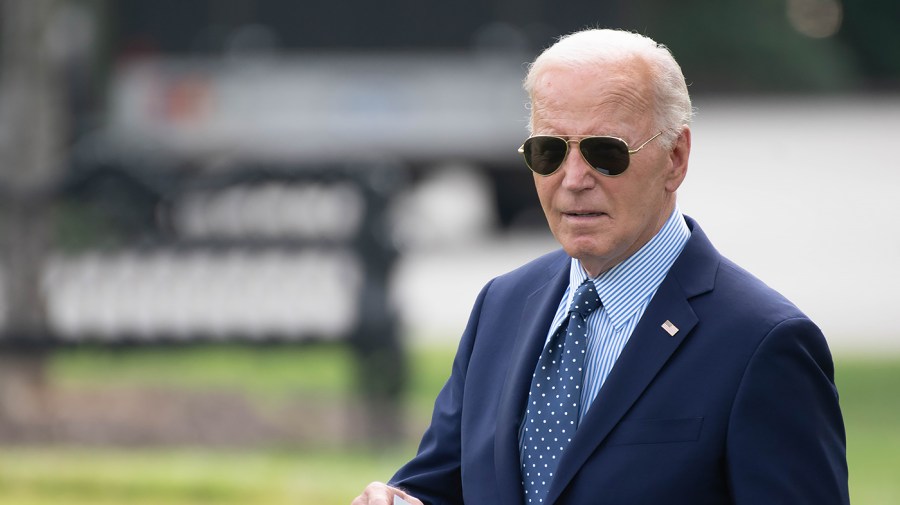
More than a dozen Senate Democrats are slamming President Biden for releasing $320 million in U.S. military assistance to Egypt despite what they call serious human rights concerns over the government in Cairo.
It is the first time the Biden administration has decided to release the full amount of funds over the course of the president’s term, and comes as the U.S. is relying heavily on Egypt as a mediating partner between Hamas and Israel over the war in the Gaza Strip.
But Democrats are arguing that the amount of funds linked to progress on human rights is small enough not to jeopardize the military-to-military relationship, though important in reinforcing U.S. values and commitments. Of the $1.3 billion in assistance to Egypt, only $320 million is subject to considerations on progress on human rights.
Sen. Patty Murray (D-Wash.), the president pro tempore of the Senate and the chair of the Appropriations Committee, became one of the most senior Senate Democratic voices to criticize the president for sending U.S. aid to Egypt despite the government’s failure to release political prisoners.
“When we can stand up for the values that define American democracy — freedom, liberty, and so much else — we absolutely must … the conditions Congress places on foreign aid must be respected by any administration,” she said in a statement Thursday. This followed statements of concern from at least 12 other senators released over the past few weeks.
Murray’s statement comes in response to Secretary of State Antony Blinken notifying Congress on Wednesday that the administration was issuing a national security waiver to deliver $320 million in foreign aid to Egypt that is contingent on Cairo addressing U.S. concerns over human rights abuses.
Murray, in her statement, called for the Egyptian government to release Hosam Khalaf and Seif Fateen, whose families live in Washington state, and U.S. lawful permanent resident Salah Soltan.
Human rights groups and lawmakers say the charges against Khalaf and Fateen, arrested in 2017 and 2018, respectively, are politically motivated. Likewise, Soltan was arrested in 2013 and is described as wrongfully detained.
A State Department spokesperson told Reuters in a statement that Blinken waived a certification requirement on $225 million related to Egypt’s human rights record this year, citing “the U.S. national security interest.” Similarly, Blinken reportedly determined that Egypt had made sufficient efforts on political prisoners to release $95 million in military assistance.
“This decision is important to advancing regional peace and Egypt’s specific and ongoing contributions to U.S. national security priorities, particularly to finalize a ceasefire agreement for Gaza, bring the hostages home, surge humanitarian assistance for Palestinians in need, and help bring an enduring end to the Israel-Hamas conflict,” the spokesperson said.
But Democratic Sens. Chris Coons (Del.) and Chris Murphy (Conn.), criticized the decision.
“The law is clear: Egypt is required to make ‘clear and consistent progress’ in releasing political prisoners in order to receive $95 million — a small portion — of its $1.3 billion military aid package this year,” the senators, both senior members of the Senate Foreign Relations Committee, said in a joint statement released on Wednesday.
“The Egyptian government has failed that test. Over the last year, for every single political prisoner Egypt has released, it has jailed two more. That’s not clear and consistent progress – it’s one step forward and two steps back. And among the thousands and thousands of political prisoners the government has continued to refuse to release are two U.S. legal permanent residents, Hosam Khalaf and Salah Soltan.”
Last week, Murphy led nine Senate Democrats urging Blinken to withhold the full $320 million in foreign military financing to Egypt, money provided to partner countries that can be spent on the purchase of U.S. military equipment.
Murphy, chair of the Senate Foreign Relations Subcommittee on Near East, South Asia, Central Asia and Counterterrorism, acknowledged in the letter Egypt’s important partnership with the U.S. in efforts to secure a cease-fire between Israel and Hamas in the Gaza Strip, and as a counterterrorism partner against threats from ISIS and extremist groups, but stressed that human rights concerns should also be taken into account.
“The decisions to withhold these funds the last several years have resulted in the Egyptian government taking some steps in some areas to address U.S. concerns,” Murphy wrote in a letter to Blinken last week.
“But the steps to date have been wholly inadequate and undermined by regressions in other areas; we must therefore continue to demonstrate our concern for Egypt’s long-term stability by again withholding these funds until the government takes sustained and effective steps to improve human rights, as U.S. law requires.”

